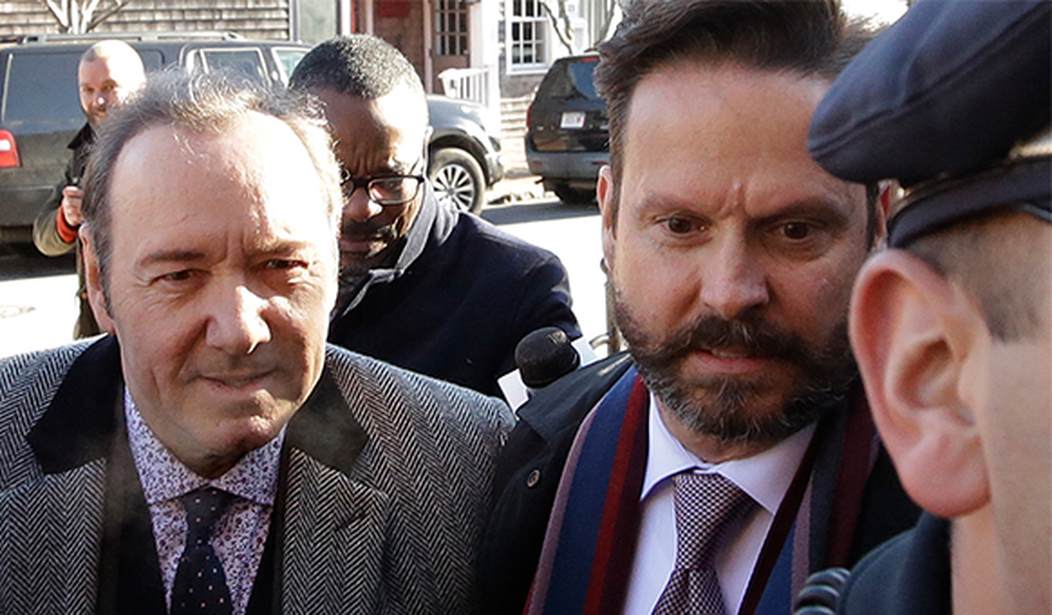For the past five years or so, Kevin Spacey has been in and out of courtrooms or attorneys’ offices trying to defend himself from allegations of sexual misconduct. On Thursday, he was found not liable for a claim brought by another actor named Anthony Rapp. The allegation was ancient – according to Rapp, it happened in 1986, when Rapp was 14 and Kevin Spacey was 26. The civil suit was brought based on a law that allowed minors (at the time) to revive a claim that would have been otherwise barred by the statute of limitations.
Kevin Spacey went from mega-star to the dumpster in what seemed like a heartbeat. He was the star of “House of Cards,” and had won two Oscars –something that most actors can only dream of. His “dream” was a nightmare for a lot of people he worked with.
The Me Too movement took center-stage, and it became acceptable to speak up about powerful people acting on the power to prey on women – and men. Harvey Weinstein, a man whom everyone in the industry and on the fringes knew was a slimy sex fiend, was exposed and convicted. He’ll likely spend the rest of his days in prison. After one of the biggest players was brought down, the floodgates opened. It became “okay” to out someone in power and position for being exploitive sexually inappropriate, and just plain awful. The crosshairs soon leveled on Kevin Spacey. He was exposed as a jerk, and for acting wildly and aggressive toward younger men on the set of “House of Cards.” Something most people knew, that Spacey was gay, became front page news.
Spacey was terminated from “House of Cards,” and sued. Just this past August, he was ordered to pay 31 million dollars to the producers of House of Cards because his conduct caused the show to end.
According to Variety:
Spacey, who played Frank Underwood, was kicked off the series during its sixth season after facing allegations that he had sexually assaulted and preyed upon young men, including a “House of Cards” production assistant who said Spacey groped him, prompting MRC’s investigation.
Los Angeles Superior Court Judge Mel Red Recana confirmed an award previously handed down by an arbitrator in October 2020, which consisted of around $29.5 million in damages and $1.5 million in costs and fees.
Spacey’s legal perils are not over. Spacey will spend more time in a courtroom, this time in the U.K, and this has more dire consequences than paying money to a producer or a judgment to Rapp. He’s been charged with sexually assaulting three men in England. He is expected to go on trial there starting June 6, 2023. Convictions could land him prison.
For the Rapp civil trial, Rapp presented evidence that, as a minor he attended a party at Spacey’s apartment and that, because he didn’t know anyone at the party, he alone went to the bedroom to watch TV. Rapp alleged that Spacey came into the bedroom and assaulted him. Although he claims to have told friends about this alleged assault over the years, he only went public with it in 2017. From an evidence stand point, the “kill shot” (from what I could discern from reading an account of the trial) was that Spacey didn’t have an apartment in 1986 with a bedroom. He rented a studio apartment. If that major detail of the incident is proved to be false, generally a jury will not believe the claimant. Here, Rapp described a bedroom, and an assault in a room that didn’t exist.
Also, any civil trial has pretrial motions in which issues of discovery, witnesses, and evidence are discussed, allowed, or disallowed. The judge would not allow any evidence of the criminal case pending against Spacey in the U.K. That was a correct call. It was clearly more prejudicial than probative.
Both parties apparently had impassioned, tearful testimony, but it appears that Spacey was believed and Rapp was not. A jury is charged with listening to the evidence in front of them. They are not allowed to, and should never, consider other things that they may know or heard about either party outside of the courtroom. The jury took only 90 minutes to decide that Rapp had not proved his case so they, correctly, only considered the evidence in front of them, not the external evidence of Spacey’s apparent and well documented misdeeds.
In this case, as much as Spacey seems to be an awful man, the system worked.















Join the conversation as a VIP Member